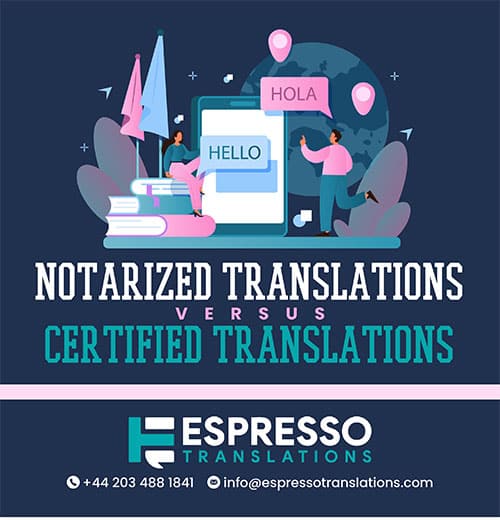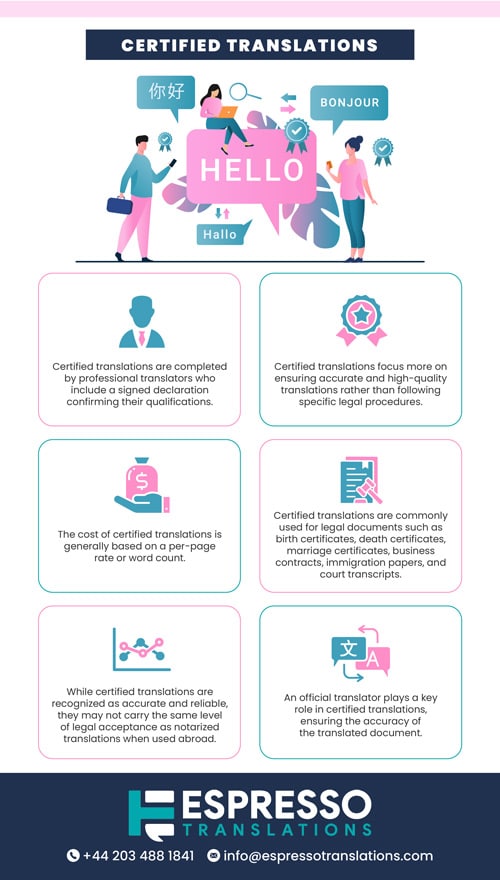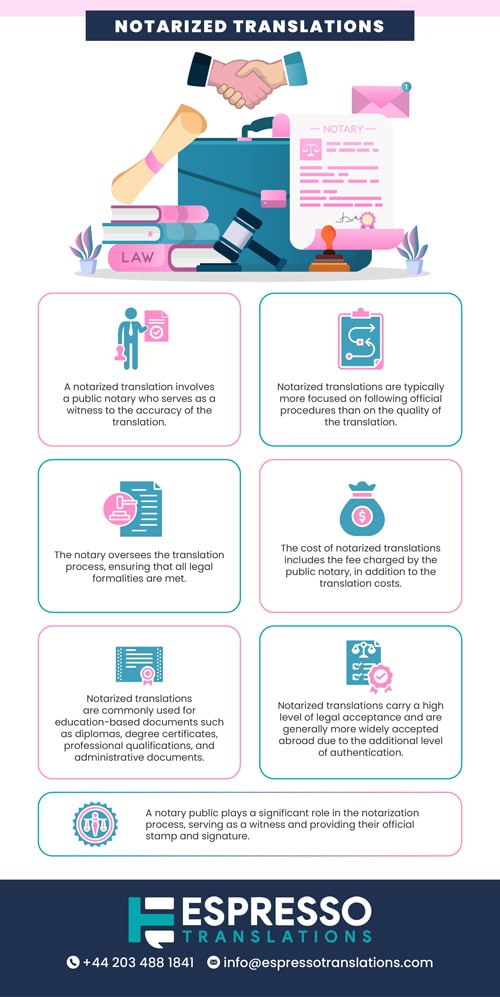There are many different types of official translation, which can be very confusing for anyone seeking document translation services. The two that are most commonly confused are certified translation and notarized translation.
Understanding the difference between notarized and certified is important when submitting legal documents or documents for official purposes, and there are several key distinctions. In this guide, we will detail the differences between each one and outline the reasons you may need notarized translation or certified.
What is the difference between certified and notarized translations?
The difference between certified and notarised translations is that a certified translation is done by a professional translator and must be signed by the translator to attest to the fact that it is a true and accurate representation of the original document.
In the case of notarized translation a further step is added. The translator appears before a notary public with their certified translation and the notary will verify the identity of the translator and authenticate their signature on the translation certification.
What are the requirements for notarised translations and certified translations?
The requirements for certified vs notarized translations are listed in the table below:
| Requirement | Certified Translation | Notarized Translation |
|---|---|---|
| The translator needs to be proficient in the original and target languages | Yes | Yes |
| The translator must have sound knowledge of the subject in question | Yes | Yes |
| The source document should be translated fully and accurately | Yes | Yes |
| The translated document comes with a statement or ‘Certificate of Accuracy’ that attests to the translator’s proficiency and the veracity of the translation | Yes | Yes |
| The individual who is to certify the translation must sign the certificate of accuracy whilst witnessed in person by a notary public | No | Yes |
| A public notary attests the identity of the person signing, witnesses them sign the certificate, and then notarizes the document with their signature and seal | No | Yes |
What is the role of a notary public and a certified translator?
A certified translator is responsible for producing high quality, accurate and reliable translations that meet professional translation standards. They attach a statement of truth or affidavit to the translation to give it legal validity.
The notary public acts as a witness and oversees legal formalities such as signing certificates and providing official stamps. Their role focuses purely on following official verification procedures rather than checking the accuracy or quality of the translation.
What is the cost of certified document translation vs notarized translations?
The cost of certified and notarized translations varies a lot. Usually, the cost of certified translation is calculated per word, number of pages, or hour. Most translators charge an additional fee for certification due to the extra quality control checks that need to be carried out and the personal responsibility they assume in certifying that the translation is accurate.
For notarized translation services, a fee is paid to the notary public or translator, usually per page.
What is the difference in legal acceptance between notarized and certified translation services?
The difference in legal acceptance of a notarized and certified translation is as follows:
Certified translations
- These are generally accepted for most official and legal proceedings such as immigration and court submissions in countries like the UK or the United States
- Academic institutions commonly require certified translations for diplomas and other educational documents.
- The government often asks for a certified translation of official papers for purposes such as obtaining a visa, naturalisation and immigration procedures.
Notarized translations
- Notarized documents are usually required for more formal legal documents, particularly for legal translations that are to be used in foreign countries.
- Certain jurisdictions or institutions request a notarized document as they provide an extra level of authenticity.
- They are often needed for documents including deeds of property, power of attorney and adoption papers.
When to use a certified translation and a notarized translation?
Certified document translation services are required when submitting important documents to official bodies in England & Wales, such as the Home Office, Foreign Office, HM Courts & Tribunal, UK Passport Office, UK NARIC, Ministry of Foreign Affairs and other official bodies.
Notarized translations are often required for education-based documents, such as diplomas, degree certificates and other administrative documents.
The key to selecting the right kind of translation is to check with the relevant authority or organisation as to exactly what they require.

What is a certified translation?
Certified translations must include the translator’s name, signature, contact details and the date of the translation, along with a signed attestation stating that it is a true and accurate translation of the original document.
What is the purpose of a certified translation?
A certified translation confirms the identity and personal data of the translator so that if anything were to go wrong as a result of a mistranslation, the translator can be held liable. Errors or inaccuracies can lead to serious implications so responsibility is paramount.
When to use certified translations?
Certified translation is usually required for the following documents:
- Birth certificates
- Death certificates
- Marriage certificates
- Business contracts
- Immigration papers
- Court transcripts
Who can provide certified translations?
In many countries, certified translations must be completed by a government-endorsed translator, also known as a sworn translator. In the UK, however, there are no official requirements for becoming a certified translator.
Some public sector institutions may require that your official document be translated by a translator or translation company that is accredited by a professional body within the translation industry, such as the Chartered Institute of Linguists, the Institute of Translation and Interpreting (ITI) or the Association of Translation Companies (ATC).
Also Read: What is the difference between certified translation and sworn translation?

What is a notarized translation in the UK?
Notarized translation in the UK involves having the identity and signature of the translator who completed the translation verified. You may need a notary certified translation service for administrative documents, legal agreements or certificates to be issued to UK or foreign public entities.
Once a translator has translated a document from one language to another and added a translation certification, they will appear before a notary public, together with a valid form of ID, and the notary will verify the identity of the translator and authenticate their signature on the translated documents.
This process provides an extra level of trustworthiness and credibility. However, it should be noted that the accuracy of the translation is not verified by the notary and it does not prove the copy is accurate.
How do I get a translation notarized?
To get a translation notarized, you should first speak to the requesting entity to understand the exact requirements for the notarisation. This includes checking whether the notarisation should be done in the source language country or the target language country. You should also check whether the original documents need to be apostilled before the translation is notarised.
Once the requirements are clear, contact a translation agency with proven experience in this field. Make sure you send clear scans of your documents and offer digital transcriptions of any handwritten parts.
When selecting the best agency, be sure to check their privacy policy to understand how your personal data will be handled before you send your documents.
When to use notarized translation?
You will need notarized translation services for very formal, legal documents that require certification by a notary. Notarized translations are commonly required for education-based documents such as diplomas, degree certificates, professional qualifications and other administrative documents, particularly overseas.
They are often more accepted abroad as they are certified by a government appointee. It is important to check with the institution requesting translation to determine the required type of certification.

What does local notary public mean?
A local notary public is a qualified lawyer who can impartially witness and attest to the authenticity of the translator who carried out an official translation. They oversee legal formalities such as signing certificates, providing stamps and following official procedures, as opposed to checking for translation accuracy.
They are commonly solicitors who have taken a specialised qualification in order to become a notary public.
Different requirements in different countries
The process of certified and notarized translations differs outside of the UK. Many countries have a government body that endorses translators in certain languages, known as sworn translation.
Each country has different requirements, so it is best to find out exactly what the requirements are for that particular country before having your document translated. Translations for some countries may need to be done by members of particular institutional bodies, for example, while others may need to be completed by a certified specialist translator.
If you’re still not sure what type of translation you need, get in touch with our expert team for free help and advice.

